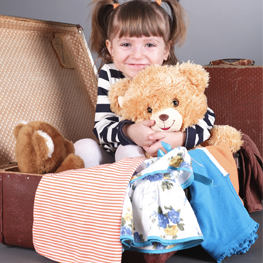
For parents motivated by a desire to maintain or rekindle connections with family across the country or around the globe, having children can lead to more travel than ever. But maybe you’ve put off visiting relatives or given up on your dream vacation, daunted by the uncertainties of coordinating life with children away from home. Preschoolers thrive on routine, but travel throws families into new situations and different time zones and requires a certain level of compromise. Travel-savvy parents know that routines tempered with flexibility are the key to keeping everyone happy on the road.
“Some children actually adapt to changes better than their parents,” says Shelly Rivoli, author of the award-winning Travels with Baby: The Ultimate Guide for Planning Trips with Babies, Toddlers, and Preschool-Age Children (Travels with Baby Books, 2007). Children and their parents are likely to have a combination of temperaments, says Rivoli. Within reason, families need to accommodate the person the least tolerant of disruption.
Bedtime rituals
Familiar bedtime routines can help young children settle down in a strange location even at odd hours. Whether your regular routine includes a bedtime story, singing a special song or simply brushing teeth, be sure to continue the same routine during your trip. A tired family is a cranky family and you don’t want vacation memories sullied by tantrums and exhaustion. Retaining bedtime rituals in particular will lead to more rest for everyone, and more enjoyment overall.
If you have a multi-step bedtime routine, consider which parts are portable and which ones can be left at home. If your child sleeps with a nightlight, for example, Rivoli recommends investing in a travel-friendly model to assure you have one wherever you go. Allow your destination, plans for the next day and knowledge of your family’s temperaments to guide your choices. On late nights or when you know a long sight-seeing day is scheduled, consider retaining your routines, but shortening them. On a relaxed family vacation when a leisurely pace is part of the whole experience, indulge yourself by lengthening and savoring parts of your routine that you would hurry through at home.
Time zone tips
Traveling to different time zones creates a unique challenge for families trying to see and do and get some rest. Marija Hobbs started traveling internationally with her husband and two sons when the boys were three and five years old. She recommends parents encourage their children to sleep on long flights and make sure that comfort items such as a blanket or stuffed animal are in their carry-on.
“Once landed, set your watch to the local time zone and hit the ground running,” says Hobbs.
The excitement of being at your destination will help power all of you through your first day; just try to get everyone to sleep early the first two nights. The time zone change from West coast to East coast is probably the easiest to navigate with children. “When traveling to the East coast, we retained a schedule,” says Hobbs. “It meant later wake-up times and later bedtimes but worked very well, resulting in zero adjustments there and back.”
Foreign food
Picky eaters can ruin their parents’ appetites anywhere in the world, but some parents discover their children are more willing to eat unfamiliar food in an unusual location. “Part of travel is to discover the culture of that region,” says Hobbs. “Kids will find something they like and will try new things if that’s all that is offered."
It becomes their new normal.”Hobbs packs a few of her sons’non-perishable favorites such as instant oatmeal on overseas trips, but generally doesn’t worry about food.
Establish boundaries
Traveling with children requires parents to be honest with themselves about what they can expect to accomplish in a day, and then to communicate their boundaries to travel companions. “When we visit grandparents or friends, I try to make it really clear that the kids need downtime,” says mom Diane Zipper. Grandparents especially want to indulge kids, spend more time with them and let them stay up late. Friends or family members without children won’t necessarily understand what is realistic to expect from young children. “You know your child,” says Zipper, “and it’s really embarrassing when they throw tantrums. For us, it was important to stay on a schedule.”
Finally, be prepared for the rough spots, but don’t let your worries keep you at home. As Hobbs says, “Your kids are more adaptable than you think!”
Freelance writer Heather has discovered that she has less tolerance for the disruptions inherent in travel than two of her three children.
Calgary’s Child Magazine © 2025 Calgary’s Child